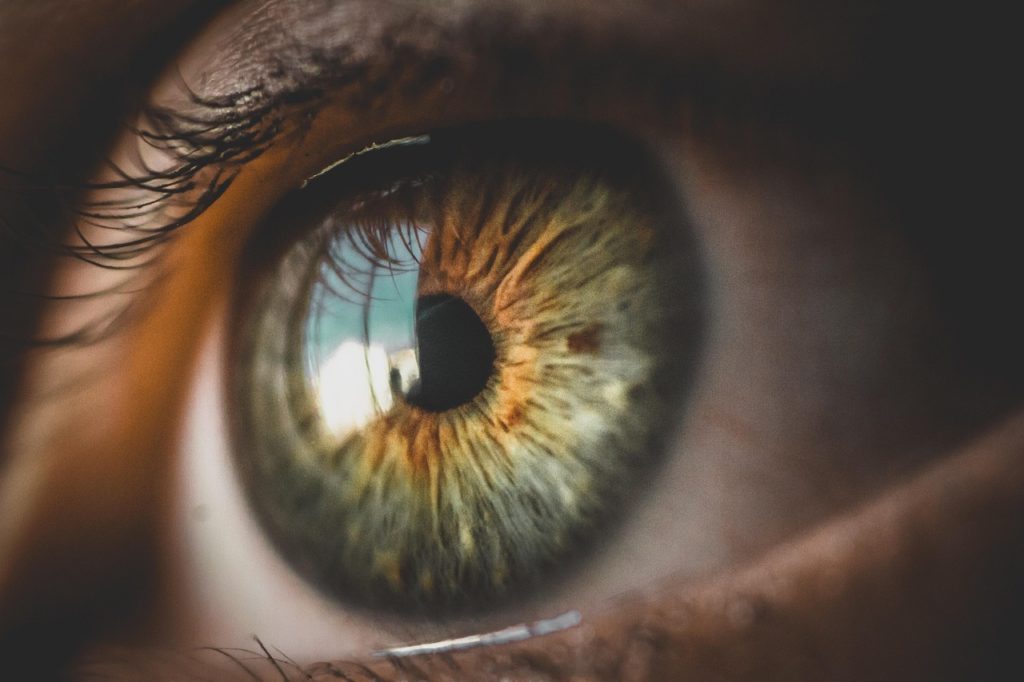
Macular degeneration, often referred to as age-related macular degeneration (AMD), is a progressive eye condition that affects the central part of the retina, called the macula. This region is responsible for our central vision, allowing us to see fine details, recognise faces, and read.
Macular degeneration is primarily associated with ageing, typically affecting people over 50. However, it’s essential to understand that macular degeneration isn’t a single condition but rather a term encompassing two main types: dry and wet macular degeneration.
Dry Macular Degeneration
Accounting for about 90% of cases, dry macular degeneration is the more common form. It is characterised by a gradual thinning of the macula as part of the natural ageing process. Think of it as wear and tear on your retina over time. This form of the condition typically progresses slowly, and vision loss occurs gradually.
Wet Macular Degeneration
While less common (affecting only about 10% of macular degeneration patients), wet macular degeneration is more severe and can lead to rapid vision loss if left untreated. In this form, abnormal blood vessels grow under the retina. These vessels are fragile and can leak fluid or blood, leading to scarring and rapid damage to the macula. It’s worth noting that wet macular degeneration almost always starts as the dry form before progressing.
Causes
While the exact cause of macular degeneration isn’t fully understood, several risk factors have been identified:
Age: The risk increases significantly for those over 50.
Genetics: Family history plays a role, with certain genes linked to a higher risk.
Ethnicity: Caucasians are more likely to develop the condition than other ethnic groups.
Gender: Women are at slightly higher risk than men.
Smoking: This habit significantly increases the risk and can speed up progression.
High blood pressure and high cholesterol: These conditions can affect blood vessels in the eye.
Sun exposure: Prolonged exposure to UV light may contribute to macular damage.
Recognising the Symptoms
Early detection of macular degeneration is crucial for managing the condition effectively. The earlier you diagnose wet macular degeneration, the better the prognosis. However, macular degeneration may not present noticeable symptoms in its early stages. As it progresses, you might experience:
- Blurred or fuzzy vision
- Difficulty recognising faces
- Straight lines appearing wavy or distorted
- A dark or empty area in the centre of your vision
- Difficulty adapting to low light levels
- Decreased colour intensity
If you notice any sudden changes in your vision, such as a dark blob appearing in your central vision or any distortion (like straight lines appearing crooked or zigzagged), it’s crucial to see an eye care professional immediately.
Regular eye check-ups are vital, especially if you have a family history of macular degeneration or other risk factors. Many opticians now offer OCT (Optical Coherence Tomography) scans, which can detect early signs of macular degeneration before symptoms become noticeable. You should be able to check whether your optician offers OCT scans before making your appointment.
Impact of Macular Degeneration
While macular degeneration doesn’t lead to complete blindness, it can significantly impact a person’s quality of life. The loss of central vision can make many daily activities challenging, such as reading, driving, or recognising faces. It’s important to note that peripheral vision is usually preserved, which helps maintain some level of independence.
However, while the condition does not cause complete blindness, it can still have profound effects. Activities like moving around, cooking, cleaning, or personal grooming can become more challenging or potentially dangerous. Driving, in particular, can become very dangerous as you may be unable to see clearly. It’s crucial to inform the DVLA of your condition and undergo an assessment to ensure you’re safe to drive.
These challenges can also impact mental health as the loss of independence and the ability to enjoy previous activities can lead to feelings of frustration, anxiety, or depression.
It’s essential for those diagnosed with macular degeneration to seek support, both from healthcare professionals and support groups. Informing friends and family about the condition can also help in getting the necessary assistance and understanding.
Treatment Options
The treatment for macular degeneration depends on whether it’s the dry or wet form of the condition.
Dry Macular Degeneration
Currently, there is no approved treatment to reverse dry macular degeneration. However, lifestyle modifications can help slow progression, including:
- Quitting smoking
- Maintaining a healthy diet rich in leafy greens and fish
- Regular exercise
- Protecting eyes from UV light with sunglasses
- Controlling blood pressure and cholesterol levels
Wet Macular Degeneration
For wet macular degeneration, treatment involves regular anti-VGEF injections to slow the progression of the degeneration. In a small number of cases, vision improves. But for most patients, the injections merely slow the degeneration, which is why it is so important to catch it early. Around 10% of patients do not respond to treatment. However, there are several types of anti-VEGF medications available to try if one doesn’t work. Each has similar efficacy but some may work better for different patients. Your eye specialist can discuss the options and help determine the best choice for you.
Anti-VEGF injections work by blocking a protein called vascular endothelial growth factor (VEGF), which stimulates the growth of blood vessels. While this protein is very useful in helping repair the body, especially after a stroke or heart attack, it leads to the growth of harmful abnormal blood vessels in the eyes which leads to wet degeneration. By inhibiting VEGF, these injections can slow or stop the progression of the disease and, in some cases, even improve vision.
That being said, for patients who have recently experienced a stroke or heart attack, the priority needs to be healing the blood vessels around the heart and brain. As such, anti-VEGF injections are not suitable and you will need to wait for at least three months to begin treatment. Your consultant will discuss with the risks involved in such cases.
The treatment process involves regular injections, typically monthly to start, with ongoing monitoring using eye scans to assess response. Treatment intervals are then adjusted based on individual response (a ‘treat and extend’ approach). So, you may have the first few injections every four weeks, then every five or six weeks, up to one every three or four months.
Living with Macular Degeneration
While macular degeneration can be challenging, there are many ways to maintain quality of life and independence:
- Low vision aids: Magnifiers, special lighting, and electronic reading devices can help with daily tasks.
- Home modifications: Simple changes like improved lighting and contrast can make navigation easier.
- Support services: Many areas have low-vision clinics and eye care liaison officers who can provide valuable assistance and advice.
- Regular check-ups: Keep your glasses prescription up to date and attend regular eye examinations.
- Support groups: Local groups and organisations like the Macular Society can provide information, advice, and emotional support.
- Stay active and engaged: Continuing with hobbies and social activities is important for mental well-being.
- Consider registration: Depending on the severity, you may be eligible to register as sight impaired, which can provide access to various support services.
Summary
While a diagnosis of macular degeneration can be daunting, it’s important to remember that with early detection, appropriate treatment, and the right support, many people with this condition continue to lead full and active lives.
By understanding the condition, following treatment plans, and making use of available support, those affected by macular degeneration can maintain their independence and quality of life for many years to come.
ABOUT THE AUTHOR
Saanan Umeed is a Medical Retina Consultant at Midland Eye. Midland Eye was founded by four ophthalmic surgeons who wanted to provide patients with a comprehensive, specialist service for the diagnosis and treatment of all eye conditions. The team are leaders in their field and offer a consultant-only service to all patients requiring eye care or surgery. Every consultant is qualified to treat common eye conditions such as cataracts but each one also has a particular area of specialisation, ensuring that patients get the best possible outcome, no matter what the diagnosis. Private patients can benefit from access to collaborative care and facilities with the latest and best technology. The clinic’s approach is designed to be convenient for people who lead busy lives and have limited time to seek medical advice and treatment.
https://www.facebook.com/midlandeyesocial
https://www.instagram.com/midland_eye
https://www.linkedin.com/company/the-midland-eye-institute-limited
